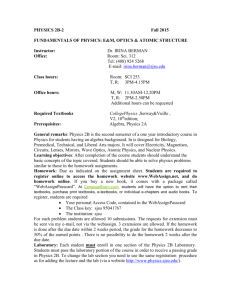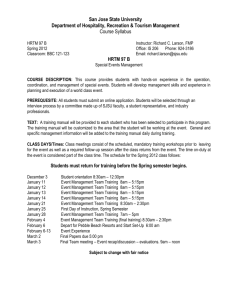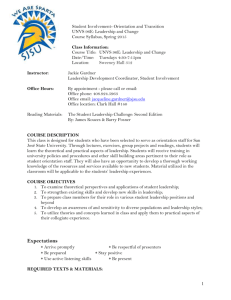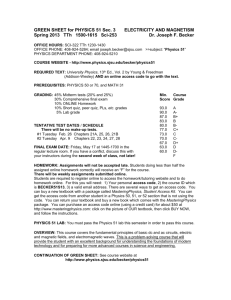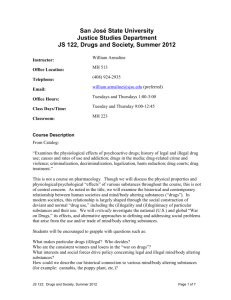Spring 2015 Syll - San Jose State University
advertisement
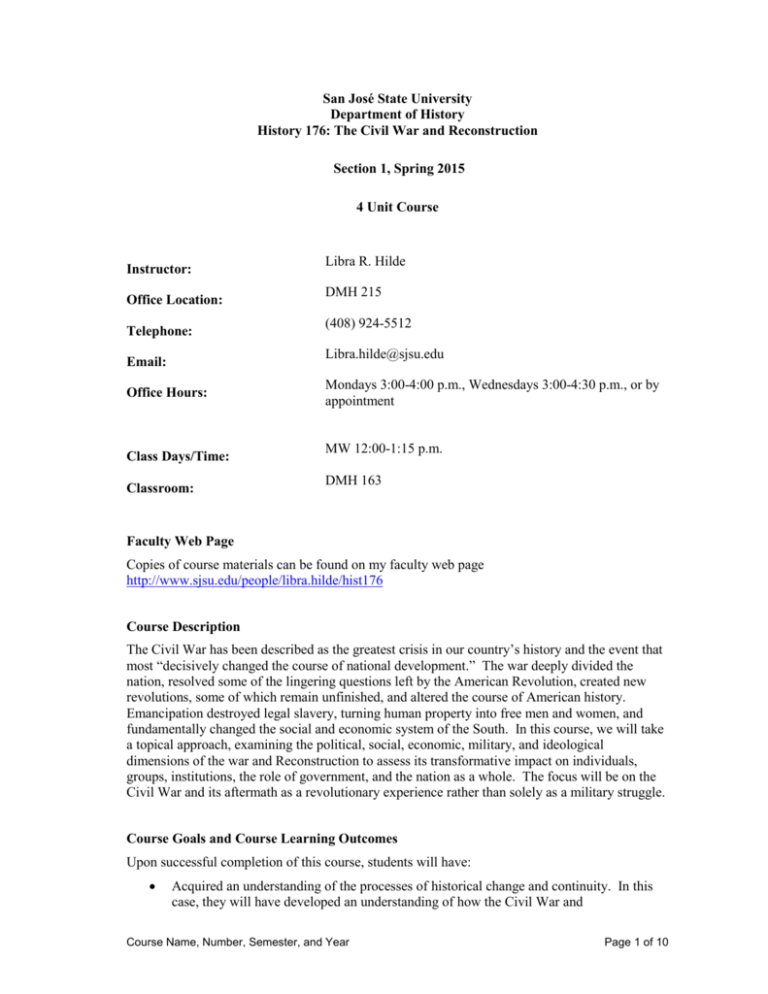
San José State University Department of History History 176: The Civil War and Reconstruction Section 1, Spring 2015 4 Unit Course Instructor: Office Location: Telephone: Libra R. Hilde DMH 215 (408) 924-5512 Libra.hilde@sjsu.edu Email: Office Hours: Class Days/Time: Classroom: Mondays 3:00-4:00 p.m., Wednesdays 3:00-4:30 p.m., or by appointment MW 12:00-1:15 p.m. DMH 163 Faculty Web Page Copies of course materials can be found on my faculty web page http://www.sjsu.edu/people/libra.hilde/hist176 Course Description The Civil War has been described as the greatest crisis in our country’s history and the event that most “decisively changed the course of national development.” The war deeply divided the nation, resolved some of the lingering questions left by the American Revolution, created new revolutions, some of which remain unfinished, and altered the course of American history. Emancipation destroyed legal slavery, turning human property into free men and women, and fundamentally changed the social and economic system of the South. In this course, we will take a topical approach, examining the political, social, economic, military, and ideological dimensions of the war and Reconstruction to assess its transformative impact on individuals, groups, institutions, the role of government, and the nation as a whole. The focus will be on the Civil War and its aftermath as a revolutionary experience rather than solely as a military struggle. Course Goals and Course Learning Outcomes Upon successful completion of this course, students will have: Acquired an understanding of the processes of historical change and continuity. In this case, they will have developed an understanding of how the Civil War and Course Name, Number, Semester, and Year Page 1 of 10 Reconstruction changed this nation in multiple ways and shaped our own society. Students will emerge from this course able to grasp not only broad contours of historical change, but able to see how momentous events affected different groups and individuals and their status in society. Developed an appreciation for the complexity of the historical process and in particular, learned how politics, society, ideology, public opinion, and the military influenced one another. Worked with primary and secondary sources on a weekly basis and honed their skills in interpreting and comparing a range of sources and perspectives, and placing those perspectives in an appropriate context. Related ongoing questions raised by the Civil War to modern society even if we cannot definitively answer those questions: For example, how far should dissent be allowed to go in wartime? What constitutes treason and what constitutes legitimate criticism of policy? Why do we have romantic notions of certain events, and how does the reality of warfare differ? What problems does a democratically elected government face when prosecuting a war? Learned the complexity of historical causation and why historians generally reject monocausal explanations for significant events. Developed an ability to use print or online resources to conduct historical research and how to construct and organize an effective analytical research paper. Conducted independent historical research using both primary and secondary sources, interpreting and analyzing the material, and presenting their ideas in effective prose. Students will emerge from this course with stronger written communication skills. Required Texts/Readings The following required readings are available at the bookstore, and have been placed on reserve at King Library. Please note that we will only read a fraction of the Clinton and Silber text, so you may choose to use the reserve copy. Textbook William Gienapp, ed., The Civil War and Reconstruction: A Documentary Collection Other Readings Eric Foner, ed., Our Lincoln: New Perspectives on Lincoln and His World Stephanie McCurry, Confederate Reckoning Catherine Clinton and Nina Silber, eds., Divided Houses: Gender and the Civil War Eric Foner, Nothing but Freedom: Emancipation and its Legacy Chandra Manning, What This Cruel War Was Over Joseph Glatthaar, The March to the Sea and Beyond David Donald, ed., Why the North Won the Civil War Other equipment / material requirements Students are required to view three movies outside of normal class hours, Glory, Gettysburg, and Lincoln. If you cannot find a copy through Netflix or the library, I have DVD’s that you can borrow. You will receive a electronic copy of all the song lyrics. Please refer to this document each week. The songs played each week will match the lecture and reading topics. Course Name, Number, Semester, and Year Page 2 of 10 Several other readings will be sent to you in electronic form. Library Liaison Nyle Monday is the library liaison for history students. Contact him at 808-2011 or Nyle.Monday@sjsu.edu Classroom Protocol My classroom protocol consists of one simple rule: don’t be dumb. You would be amazed at what you can see from the front of a classroom. Chances are, if it is rude and disruptive, I can see it even if you think I cannot. Dropping and Adding Students are responsible for understanding the policies and procedures about add/drop, grade forgiveness, etc. Refer to the current semester’s Catalog Policies section at http://info.sjsu.edu/static/catalog/policies.html. Add/drop deadlines can be found on the current academic calendar web page located at http://www.sjsu.edu/academic_programs/calendars/academic_calendar/. The Late Drop Policy is available at http://www.sjsu.edu/aars/policies/latedrops/policy/. Students should be aware of the current deadlines and penalties for dropping classes. Information about the latest changes and news is available at the Advising Hub at http://www.sjsu.edu/advising/. Assignments and Grading Policy Students are expected to arrive in class having carefully and critically read the assigned books, papers, and documents. The course will combine lecture and discussion every week, so arrive in class each Wednesday prepared to talk about the readings. Expect a full lecture on Mondays and a short lecture followed by discussion on Wednesdays. In addition, I will play one or two Civil War songs each week and hand out copies of the lyrics (in pdf form). Though these songs have clearly been recorded since the war ended, most are faithful renditions of the sound of nineteenth century military bands. The lyrics and music serve as yet another primary source that you may use for exams and papers and to gain insight into the time period. Class Participation (15%) Class participation is part of your grade. I do not call on people, so you may choose to remain quiet, but be aware that this choice will affect your participation grade. In order to earn an A or even B level participation grade, you must add to our discussions. Keep in mind that listening is important, and quality of commentary is often preferable to quantity. A student who is quiet but clearly engaged will earn a higher grade than someone who is not paying attention. Finally, students may make up for one week of missed class and discussion by writing a 3-5 page review of one of the optional books listed on the syllabus. Response Papers (10%) Based on the readings, nine short response papers of at least one page (typed, doublespaced) will be due in class each Wednesday (they will not be accepted late). Topics will Course Name, Number, Semester, and Year Page 3 of 10 be distributed a week ahead of time. The point of the response papers is to demonstrate that you have done the reading and thought about it critically, so make sure you use specific examples. You may write longer responses, but they should be at least one page long. Please type your responses. If it is clear you have not done the reading, the response will earn no credit. Response paper questions will often ask you to role play, so remember to think about the primary sources from a nineteenth century perspective. Each week, I will hand out study questions for the reading. The response paper topic/questions will be at the bottom of the page. You will choose nine, though there will be options nearly every week. It is YOUR responsibility to hand in nine response papers throughout the semester. Once a week has passed, that topic cannot be resurrected. If we reach the end of the course, and you have four weeks to go and have not handed in a response paper, that is your problem—you may not hand in more than one per week. CLO (1, 2 3, 4 and 5): The response papers and discussions will address how the Civil War changed the US, what it meant to different groups and individuals, and address questions raised by the war that remain relevant today. Midterm Exam (15%) An in class midterm exam will be given on March 16th. My exams consist of broad, interpretive essay questions. I do not have a specific answer in mind when I grade your exam. Rather, I am looking to see how well you can frame an argument and write a coherent essay using evidence from lecture and the readings to defend your thesis. CLO (1 and 2) Film Responses (15%) Students will write three short papers (2-3 pages each) that analyze the films (see assignments). Like the research paper, all late film responses will be penalized a third of a grade per day late. CLO (1, 2, 4) Research Paper of 10-12 pages (20%) Students will write a primary-source driven, analytical research paper based on a topic of their choice, but requiring the approval of the instructor. There are a number of online resources that can simplify your research, including Civil War Letters and Diaries, and the Valley of the Shadow Project. The final papers are due on May 6th. Before that time, you will need to hand in a topic statement, and have an individual meeting with me to discuss your topic, sources, and research plan. When you hand in the research paper, you will be required to submit a copy to turnitin.com and a hard copy to me. Late papers will be penalized a third of a grade per day, including weekends. CLO (6 and 7) Final Exam (25%) The Final exam will consist of two broad, interpretive essays (you will have choice). One question will cover the entire course and the other the information covered since the midterm. CLO (1, 2, 3, 4, and 5) The grading scale for this course will be: 97-100= A+ 87-89= B+ 77-79= C+ 93-96= A 83-86= B 73-76= C Course Name, Number, Semester, and Year 67-69= D+ 63-66= D Page 4 of 10 90-92= A- 80-82= B- 70-72= C- 60-62= D- A student with a semester average below 60 will fail the course. SJSU mandates that a grade of Incomplete be granted only when a student has satisfactorily completed a substantial portion of the course requirements and is unable to complete the course because of an accident, illness, or some other event beyond the student's control. Success in this course is based on the expectation that students will spend, for each unit of credit, a minimum of forty-five hours over the length of the course (normally 3 hours per unit per week with 1 of the hours used for lecture) for instruction or preparation/studying or course related activities including but not limited to internships, labs, clinical practica. Other course structures will have equivalent workload expectations as described in the syllabus. Because this is a 4-unit course, students can expect to spend a minimum of twelve hours per week preparing for and attending classes and completing course assignments. Careful time management will be required to keep up with readings and assignments in an intensive course such as this one. For this class, you will have to undertake additional activities outside the class hours including viewing three long films and meeting individually with me in the course of developing and writing your research paper. University Policies Academic integrity Your commitment as a student to learning is evidenced by your enrollment at San Jose State University. The University’s Academic Integrity policy, located at http://www.sjsu.edu/senate/S07-2.htm, requires you to be honest in all your academic course work. Faculty members are required to report all infractions to the office of Student Conduct and Ethical Development. The Student Conduct and Ethical Development website is available at http://www.sjsu.edu/studentconduct/. Instances of academic dishonesty will not be tolerated. Cheating on exams or plagiarism (presenting the work of another as your own, or the use of another person’s ideas without giving proper credit) will result in a failing grade and sanctions by the University. For this class, all assignments are to be completed by the individual student unless otherwise specified. If you would like to include your assignment or any material you have submitted, or plan to submit for another class, please note that SJSU’s Academic Policy S07-2 requires approval of instructors. Campus Policy in Compliance with the American Disabilities Act If you need course adaptations or accommodations because of a disability, or if you need to make special arrangements in case the building must be evacuated, please make an appointment with me as soon as possible, or see me during office hours. Presidential Directive 97-03 requires that students with disabilities requesting accommodations must register with the Disability Resource Center (DRC) at http://www.drc.sjsu.edu/ to establish a record of their disability. Student Technology Resources Computer labs for student use are available in the Academic Success Center located on the 1st floor of Clark Hall and on the 2nd floor of the Student Union. Additional computer labs may be available in your department/college. Computers are also available in the Martin Luther King Library. Course Name, Number, Semester, and Year Page 5 of 10 A wide variety of audio-visual equipment is available for student checkout from Media Services located in IRC 112. These items include digital and VHS camcorders, VHS and Beta video players, 16 mm, slide, overhead, DVD, CD, and audiotape players, sound systems, wireless microphones, projection screens and monitors. Learning Assistance Resource Center The Learning Assistance Resource Center (LARC) is located in Room 600 in the Student Services Center. It is designed to assist students in the development of their full academic potential and to inspire them to become independent learners. The Center's tutors are trained and nationally certified by the College Reading and Learning Association (CRLA). They provide content-based tutoring in many lower division courses (some upper division) as well as writing and study skills assistance. Small group, individual, and drop-in tutoring are available. Please visit the LARC website for more information at http://www.sjsu.edu/larc/. SJSU Writing Center The SJSU Writing Center is located in Room 126 in Clark Hall. It is staffed by professional instructors and upper-division or graduate-level writing specialists from each of the seven SJSU colleges. Our writing specialists have met a rigorous GPA requirement, and they are well trained to assist all students at all levels within all disciplines to become better writers. The Writing Center website is located at http://www.sjsu.edu/writingcenter/about/staff/. Peer Mentor Center The Peer Mentor Center is located on the 1st floor of Clark Hall in the Academic Success Center. The Peer Mentor Center is staffed with Peer Mentors who excel in helping students manage university life, tackling problems that range from academic challenges to interpersonal struggles. On the road to graduation, Peer Mentors are navigators, offering “roadside assistance” to peers who feel a bit lost or simply need help mapping out the locations of campus resources. Peer Mentor services are free and available on a drop –in basis, no reservation required. The Peer Mentor Center website is located at http://www.sjsu.edu/muse/peermentor/ Course Name, Number, Semester, and Year Page 6 of 10 History 176, Spring 2013, Course Schedule Table 1 Course Schedule Week 1 Date Topics, Readings, Assignments, Deadlines January 26 Introduction and Course Overview January 28 Rising Sectional Tensions, 1820-1860 No Reading No Response Paper 2 February 2 Secession, and the Outbreak of War February 4 Reading: Gienapp, The Civil War and Reconstruction: A Documentary Collection, 3-82. Optional Reading: Freehling and Simpson, Secession Debated 3 February 9 Abraham Lincoln February 11 Reading: Foner, ed., Our Lincoln, 19-79, 223-266. Gienapp, Documentary Collection, 115-130, 165-178. Film: Lincoln (response due the following week) 4 February 16 Union Politics, Election of 1864 February 18 Reading: Reading: Foner, ed., Our Lincoln, 109-222. Political Cartoons (pdf) Film Response Due (Lincoln) Discuss online sources for research paper 5 6 February 23 The Union Home Front February 25 Reading: Gienapp, Documentary Collection, 179-196, 261-279. Paper topic Statement Due March 2 Jefferson Davis and the Confederate Government, 1861-1865 March 4 Reading: McCurry, Confederate Reckoning, 1-132, OR Escott, After Secession, 19-134, 169-274. Gienapp, Documentary Collection, 131-146. Course Name, Number, Semester, and Year Page 7 of 10 7 March 9 The Confederate Home Front March 11 Reading: McCurry, Confederate Reckoning, 263-361. Gienapp, Documentary Collection, 197-218, 281-291. Optional Reading: J. Anderson, ed., Brokenburn: The Journal of Kate Stone Women 8 March 16 MIDTERM March 18 Reading: LeeAnn Whites, “The Civil War as a Crisis in Gender,” chapter 1 of Divided Houses, Drew Gilpin Faust, “Altars of Sacrifice: Confederate Women and the Narratives of War,” chapter 10 in Divided Houses, 171-199. Joan Cashin, “‘Since the War Broke Out’: The Marriage of Kate and William McLure,” chapter 11 of Divided Houses, 200-212. Jeanie Attie, “Warwork and the Crisis of Domesticity in the North,” chapter 14 of Divided Houses, 247-259. MARCH 23-27, SPRING RECESS 9 March 30 April 1 Week 8: Emancipation and Black Soldiers Reading: James Henry Gooding Letters, from Virginia Adams, ed., On the Altar of Freedom (1991), selections, pdf. George E. Stephens Letters, from Donald Yacovone, ed., A Voice of Thunder (1997), selections, pdf. Jim Cullen, “‘I’s a Man Now’: Gender and African American Men,” Chapter 5 of Divided Houses, 77-91. Foner, Nothing but Freedom, Emancipation and its Legacy, 1-110. Gienapp, Documentary Collection, 219-234. Film: Glory Film Response Due Optional Reading: Joseph Glatthaar, Forged in Battle: The Military Alliance between White Officers and Black Soldiers 10 April 6 April 8 Week 10: Soldiers Reading: Manning, What this Cruel War was Over Gienapp, Documentary Collection, 235-248. Reid Mitchell, “Soldiering, Manhood, and Coming of Age: A Northern Volunteer,” chapter 3 of Divided Houses, 43-54. David Blight, “No Desperate Hero: Manhood and Freedom in a Union Soldier’s Experience,” chapter 4 of Divided Houses, 55-75. Course Name, Number, Semester, and Year Page 8 of 10 11 12 13 April 13 Week 11: The Military Struggle and Total War April 15 Reading: Joseph Glatthaar, The March to the Sea and Beyond (split with the following week). Gienapp, Documentary Collection, 83-113, 147-163, 249-260. April 20 Week 12: The Military Struggle Continued April 22 Film: Gettysburg Film Response Due April 27 Week 13: Union Victory, Confederate Defeat April 29 Reading: Donald, Why the North Won the Civil War, 15-112. Gienapp, Documentary Collection, 293-314. During the discussion part of class for this week, we will have a formal debate and break up into groups assigned during the previous week. Every student will read the Donald book, which includes essays that present mono-causal explanations for the Union victory and Confederate defeat (the teams will be Social, Political, Diplomatic, and Economic). Each student should come to class prepared to discuss and defend the explanation given for their subject, and argue against the other groups. Each group will have equal time to prepare, present their initial arguments, prepare a rebuttal, and present the rebuttal. At the end, we will vote for the team that made the best presentation, and hold another vote for the explanation you deem most effective. Finally, we will discuss the reasons why historians often reject mono-causal explanations for events. 14 May 4 Memory and the Legacy of the Civil War/Reconstruction May 6 Reading: David Blight, “’For Something Beyond the Battlefield’: Frederick Douglass and the Memory of the Civil War,” Journal of American History, v. 75 (March 1989): 1156-78. (J-STOR). Catherine Clinton, “Reconstructing Freedwomen,” chapter 17 of Divided Houses, 303-319. Foner, ed., Our Lincoln, 269-282. Research Paper Due Optional Reading: David Blight, Race and Reunion 15 May 11 Reconstruction Course Name, Number, Semester, and Year Page 9 of 10 Final Exam May 13 Reading: Gienapp, Documentary Collection, 315-end. May 21 The Final Exam for this course will take place on Thursday, May 21, 9:45 a.m. to 12:00 p.m. Course Name, Number, Semester, and Year Page 10 of 10

